
Guatemala
People's Guide Tours
Discovering the Roots of Enchantment
in Guatemala and Honduras
 Part 5
Part 5
By Sharon Luckerman
Our new guide, Mike Shawcross, originally from England, has lived in Guatemala for the past twenty years. His bags are filled with books in English on the history and political development of Guatemala. Owner of a bookstore in Antigua and an editor for many of the political, historical books translated into English, Mike founded a well regarded private aid program for highland Indians.
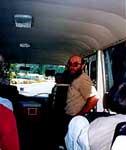 |
|
Mike Shawcross
|
|
He promised to return in a few months to let them know how his search was progressing.
When he arrived the second time, unable to find them a teacher yet, he noticed a beautiful, new building the villagers had built since his last visit there. "A school," the elders told him. "We wanted to encourage a teacher to come to our town."
Within a few months, Mike found a teacher for this village.
Most of Mike's work was done in the region known as the Ixil (pronounced E- sheel) triangle, formed by the three largest towns in the area. Along with other scattered towns and hamlets, the Ixil triangle, he believes, is the most beautiful region in Guatemala. The heart of contemporary Maya culture, the region was sadly the area of greatest rebel action and destruction during the recent war.
One of the first subjects we raise with Mike is the newly signed peace agreement between the Guatemalan government and the rebels after 36 years of fighting. We left the United States just as it was signed.
Will it work? Who are the rebels? Who do the Indians side with?
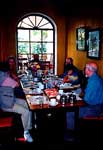 He is cautiously optimistic, but already the news that day signals difficulties. He shakes his head at the morning's headlines in Pensa Libra, February 28, l997, and translates for us, "UN--Arms: Guerilla Upset; Gov't Asks that UN Demand Guerilla Hand Over All Weapons."
He is cautiously optimistic, but already the news that day signals difficulties. He shakes his head at the morning's headlines in Pensa Libra, February 28, l997, and translates for us, "UN--Arms: Guerilla Upset; Gov't Asks that UN Demand Guerilla Hand Over All Weapons."At dinner that evening at Hotel Pasada, a lovely 200 year old hotel in Coban (not to be confused with Copan, Honduras), Mike shares his books on Guatemala and on the Ixil, "Between two Armies in the Ixil Towns of Guatemala," by David Stoll, "The Sweet Waist of America," by Anthony Daniels, "The Beauty that Hurts, Life and Death in Guatemala," by George Lovell. Bedtime reading, we joke, for those of us who can stay awake.
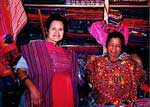 |
|||
Gloria in the Huehuetenango Market |
|||
Coban produces flowers for export, and all around the interior of the hotel and its outdoor courtyard bouquets flow from standing and hanging pots.
As we talk, seated for dinner, two young Mayan women bring bowls of beans and rice and fresh tortillas. The kitchen is closed but they find enough chicken to make us a tasty dinner with fruit, fried plantains, and rice pudding for dessert. Too full and tired, I'm barely able to skim the books I've borrowed, and I quickly fall asleep in my four-poster bed, a vague scent of mold and flowers rising in the room.
We have many more questions for Mike the next day as we drive to market after we first search at the biotopo or "quetzal reserve" for the elusive quetzal, the exquisite but rarely seen national bird of Guatemala. Our curiosity about the Maya, their culture, and all they've had to survive grows into questions about ourselves, our society, the dominant culture in the world -- like the ancient Maya citizens of Copan once were.
How do we handle power?
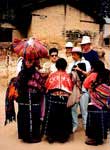 |
||
Shopping In Nahuala |
||
Over lunch, our conversation continues to a less political, more philosophical discussion of technology. What do we gain by it? Or lose? We, citizens of the United States, feel the qualitative change in our lives as we move from the Industrial to the Electronic Age -- from the speed of mechanical motion to the speed of light. We feel, though don't completely understand, the complexities, the compounding of knowledge and information that are imposed on us. It can inspire as well as weigh us down with the myriad possibilities in life; from great discoveries over a lifetime to many accomplishments in a day.
Yet I wonder if all this information actually makes us wiser.
At times, I laugh at the idea of "labor saving devices" saving us time. Mind you, I'd hate to give up my washing machine and dryer and scrub my clothes on the banks of the Detroit River, as we see many Mayan women do in the rivers and streams we pass. Or for that matter, I wouldn't choose to give up the ATM bank machine.
But what do I do with the time I save using them? I find even more errands to squeeze into my life.
What will be the legacy of the United States in the 20th century? Of democracy?
Certainly with all the violence my ancestors have faced over the centuries, I have had the best opportunities, especially as a woman, to study and live without the same level of violence. Then, again, some ancestors would have believed that the price I've paid, marrying outside my religion and distancing myself from daily religious practices, was a price too high to pay for such luxuries.
Carl, Mike, and I continue our conversation across the street in a cafe that boasts thirty two different kinds of coffee. On a terrace shaded by a large overhead awning with hanging pots of inpatients, we take a seat as several people at neighboring tables murmur, "Buenos Dias."
Our conversation moves from the questions about our society to ourselves -- who we are, what we do at home, about our families. The heat and an afternoon breeze lull us from more energetic thoughts, and we begin to sink into travel stories of our past, the near misses and humorous tales one collects when venturing out beyond the known and into another country or culture.
Continue with Part 6 of Discovering the Roots of Enchantment in Guatemala and Honduras
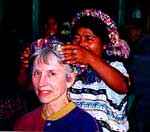
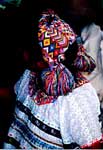
Book Reviews: The Sweet Waist of America
|
|
Susie gets a headdress in Guatemala
Top of Page
|
|||||||||||||||||||||
|
|||||||||||||||||||||